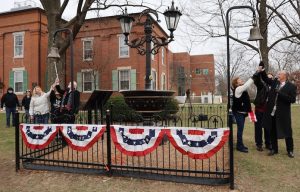Schools revamp services to address pandemic needs
Between “learning loss” and missed opportunities to socialize with peers, the COVID pandemic’s various disruptions to schools has caused administration, teachers, principals and other school staff to critically look at how to best support students.
For Waterloo and Columbia schools, this has resulted in a mixture of new initiatives and staff as well as the reorganization of already-existing services.
Both districts have added new faces to staff rosters. As Assistant Superintendent of Columbia Schools Alyssa Smith detailed, her district has hired an additional teacher for younger students.
“We started this year knowing that our youngest students, the kindergartners and first graders, because of COVID had very limited in-person exposure to school,” Alyssa Smith said. “So, right off the bat we hired an additional kindergarten and first grade teacher so that we could lower class sizes so teachers would have the opportunity to individualize (learning) for students.”
Columbia also added more intervention teachers, who are integral parts of the monthly “Soar” meetings in which they meet with teachers and assess student data to determine intervention plans for struggling students.
Waterloo Curriculum Coordinator John Schmieg said the district hired an additional reading teacher for grades K-2, as he said test scores revealed some of these students struggled with foundational reading skills, but these gaps were not “hugely significant.”
Waterloo elementary principals said they believe the additional time half-day instruction provided for reading support made it so their levels did not plummet. Zahnow Elementary principal Justin Imm noted his reading team said these scores had been pretty good compared with other recent years.
“I have a problem with the term ‘learning loss’ because ‘loss’ implies that it’s never going to be found again or that you have to search for something. I think there was just some delay,” Schmieg said. “We did hire an extra reading teacher to monitor the progress and to provide services for some of the kids that were performing below grade level.”
Zahnow Elementary, which serves grades prekindergarten through 1, also saw the addition of one new kindergarten teacher in June, Imm added.
Schmieg said ESSER funding also allowed Waterloo High School to add another English teacher, ensuring small class sizes, along with a social worker at the junior high.
Columbia purchased “Read Naturally,” a digital reading program, to help its Tier 3 students overcome the additional learning gaps the pandemic brought. Smith explained Tier 3 students are those who presented the lowest achievement levels during benchmark testing.
While “Read Naturally” coincides with the reading instruction students receive at school, Smith said it allows for more tailored instruction.
“Once we’ve identified the students that we believe need that additional intervention, they take a placement test on the program,” she said, adding the program will identify which skills taught in the past – even if it was years ago – the student needs assistance with and will re-teach those. “It will really identify very strategically but very independently for each student exactly what their needs are.”
Waterloo’s Rogers Elementary (grades 2-3) principal Brian Smith noted his school also intertwines a variety of online programs for targeted practice and has been doing so since before the pandemic.
One of the programs is “Read Naturally Live.”
Both districts hosted summer school prior to the pandemic, but have expanded these programs since at Columbia.
Alyssa Smith said before last academic year, summer school for grades 1-8 did not exist. Last summer, they opened doors to more grades and therefore more kids. They also offered more courses than they had in previous years and will continue to do so this summer.
Schmieg explained expanding summer school programming for both high schoolers and younger students included adding more subjects, offering it for longer time periods and adding more students. He said the district has always provided summer school “to where it’s needed” for each grade.
“Last summer, (Waterloo) had a pretty robust summer school, meaning more kids were invited. We were providing transportation, we had as many teachers as we felt necessary and as many paraprofessionals that were needed,” Schmieg said. “I would imagine that if needed, we would expand that more this summer also and that would all be using ESSER funds.”
Waterloo’s problem solving teams, which Brian Smith said are present for grades K-5, and Columbia’s Soar meetings, held for elementary and middle school students, existed before the pandemic. Both groups develop intervention plans for struggling students in their respective districts and buildings and consist of multiple professionals.
The demand for these services has increased since the pandemic.
“Obviously because of the increase in learning loss with COVID, we’re seeing more students be brought in. We’re also taking more teacher recommendations based on what they’re seeing in the standardized assessments,” Alyssa Smith said.
She also noted Columbia has added more intervention teachers since the pandemic. While older students do have Soar meetings, they take a different shape as they do not contain intervention teachers.
“They do have the same Soar meetings that the other buildings have, it just obviously looks a little bit different because they don’t necessarily have an interventionist. They work more with the counselors in the building to help find out, ‘What’s going on? What kinds of supports can we get you?’” she said.
Both local school districts said multiple factors can serve as the catalyst for intervention efforts, including a student’s benchmark test scores, teacher observations and parental concern.
Each Waterloo elementary school has after school programs, which are often used by intervention programming to provide students with extra academic support.
Gardner Elementary’s (grades 4-5) after school program is called CAPE, which principal Jessica Washausen explained stands for Children Accessing their Power to Excel.
When CAPE first started long before the pandemic, it focused mainly on math and other academic skills. Brian Smith said Rogers’ after school program has traditionally been tutoring-based; reteaching, tutoring, homework help, extra practice through computer programming and more are commonly seen after school.
Waterloo’s youngest students, Imm explained, also take part in a “homework club” which focuses on math and reading.
Most of the time, students participate in these programs as they wait for buses or their parents to pick them up from school.
Since the pandemic, Waterloo elementary schools have been trying to increase the reach of these programs.
“I guess the biggest change for us is we’ve just tried to add more people so we can add more groups to be able to reach more students who are in need,” Brian Smith said. “No matter what intervention, we don’t want to have too many students in there per one teacher because we think it won’t give them the support they need. So by adding more teachers, we can have more students but we can also keep the groups at the correct size.”
They are also changing programming to address the social-emotional needs of students, which the pandemic has brought to the forefront of many school-related conversations.
“At Gardner, (CAPE) was more of a homework club in the past, whereas now we’re trying to be more specific in what we’re doing. We noticed the need for social-emotional support, so we added that this year,” Washausen said, explaining CAPE students are now assigned to one of two groups: one for social-emotional support for day-to-day struggles such as anxiety and self esteem, the other for improving math and studying skills.
For Zahnow, the focus on social-emotional health is highlighted through an added emphasis on its Bulldog Buddies program.
“That’s just our way of building extra relationships with kids. There’s some schoolwork done in that (program), but it’s mainly just having fun … building those relationships and a safe place at school,” Imm explained.
Waterloo elementary schools are also continuing their What I Need, or WIN time, tradition. At every building, 30 minutes of nearly every school day is dedicated to responding to students’ additional needs.
For some, this may mean seeing a reading or math teacher for extra help.
Washausen said Gardner’s new social worker has added a boys group and a girls group to WIN time this year, which focuses on everything from self confidence to anything else “that they would need in the social aspect of school.”
Those who don’t need specific support will participate in enrichment activities for this 30-minute time span, Washausen said.
“(WIN time) is kind of our way to address all students across the buildings just to kind of meet their needs,” Washausen summarized, providing another example, “In the past, we had a kid who took a nap during that time because they were not getting sleep at home. So, we truly use that time for what they need.”
At Columbia, teachers across grade levels have begun prioritizing students’ mental health by leading their class in “mindfulness moments.”
“(It could be) a video that they’ve found to kind of help get kids settled back down and take a few minutes to relax and refocus their brain or doing something for fun like a brain break to just kind of get them up and moving a little bit but give their brains a chance to shut off for a second from the academic focus that they’re doing,” Alyssa Smith said.
She said Columbia teachers also are instructed to watch for signs a social-emo health intervention might be necessary, such as behavioral changes.
Alyssa Smith noted the strong relationships teachers form with entire classes and individual students can help guide such efforts.
“I think our teachers are excelling at that because they do such a great job of building those relationships with the students that if you didn’t have those relationships, you wouldn’t be able to have those conversations with the student or let their parent know, ‘Hey, I’ve noticed some changes, what’s going on?” she said.
For more information on available resources for students needing extra guidance in any of the above areas, contact the child’s school.






